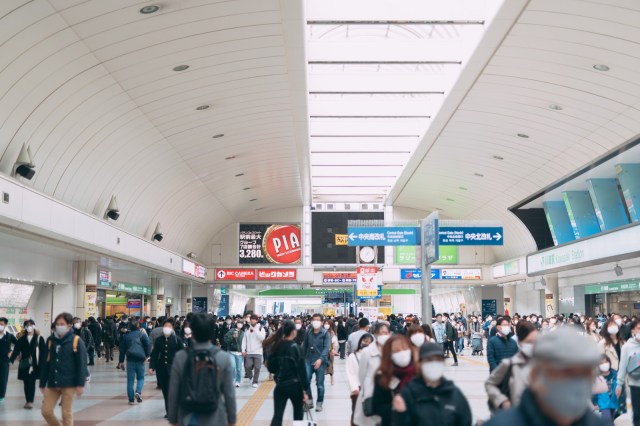
JR East representatives say change of plans is due to “lack of societal consent”.
In light of the Tokyo 2020 Olympics, major train company JR East upped their security game by installing facial recognition cameras at stations in an attempt to curb possible terrorism attacks. Using their database of images collected from JR East station surveillance cameras, the facial recognition cameras identify three groups of people: the first being persons that were previously imprisoned for committing serious crimes against JR East or JR East passengers, the second being named criminal suspects, and the third being suspicious persons.
But not anymore. On September 21, JR East announced that they have unregistered anyone in the first group due to a “lack of societal consent”. There isn’t a definitive set of rules in Japan regarding what’s acceptable and what’s not when it comes to facial recognition, which seems to be what’s making the JR Group err on the side of caution until clearer guidelines are set.
But why just one group? Even though people in the first group have committed crimes in the stations or on the trains, they are considered people that have already finished carrying out their sentences. Continuing to single them out could count as invasive surveillance since when a registered person was recognized on the camera’s system, station attendants would be required to confirm their identity, then possibly inform officers and even search them if deemed necessary.
Japanese netizens reacted on social media with a mixture of surprise and disagreement.
“I think preventing major crimes from happening again is more important.”
“Shouldn’t we be surveilling them??”
“Okay, stop this for about a week, then please start it again.”
“If there’s a legal problem that could possibly affect our safety and lifestyle, I feel like we should amend it. Even if they’ve finished their sentence, they could still recommit crimes.”
According to the latest news, JR East does plan to reinstate this system once there are clearer guidelines about facial recognition. Whatever the case, it’s clear that train stations are feeling the pressure to step up their security game in light of recent train-related attacks.
Sources: Yomiuri Shimbun via Yahoo! Japan News via Otaku.com, Bengoshi.com News via Yahoo! Japan News, Twitter
Top image: Pakutaso
● Want to hear about SoraNews24’s latest articles as soon as they’re published? Follow us on Facebook and Twitter!
 All Japan Railway Tokyo trains to finally get security cameras starting this summer
All Japan Railway Tokyo trains to finally get security cameras starting this summer Faster! Japan’s Shinkansen to get speed boost along Tohoku route
Faster! Japan’s Shinkansen to get speed boost along Tohoku route Japan Railways wants to build a team of robots to help travelers, catch criminals in its stations
Japan Railways wants to build a team of robots to help travelers, catch criminals in its stations Japanese railway company to replace the awesome title of “train conductor” with just “crew”
Japanese railway company to replace the awesome title of “train conductor” with just “crew” Woman jailed after entering Japanese train cabin with key bought at online auction
Woman jailed after entering Japanese train cabin with key bought at online auction McDonald’s new Happy Meals offer up cute and practical Sanrio lifestyle goods
McDonald’s new Happy Meals offer up cute and practical Sanrio lifestyle goods All-you-can-drink Starbucks and amazing views part of Tokyo’s new 170 meter-high sky lounge
All-you-can-drink Starbucks and amazing views part of Tokyo’s new 170 meter-high sky lounge Studio Ghibli glasses cases let anime characters keep an eye on your spectacles
Studio Ghibli glasses cases let anime characters keep an eye on your spectacles Kyoto’s 100 Demons yokai monster parade returns!
Kyoto’s 100 Demons yokai monster parade returns! Super Nintendo World expansion gets delayed for several months at Universal Studios Japan
Super Nintendo World expansion gets delayed for several months at Universal Studios Japan Arrest proves a common Japanese saying about apologies and police
Arrest proves a common Japanese saying about apologies and police Beautiful Sailor Moon manhole cover coasters being given out for free by Tokyo tourist center
Beautiful Sailor Moon manhole cover coasters being given out for free by Tokyo tourist center More foreign tourists than ever before in history visited Japan last month
More foreign tourists than ever before in history visited Japan last month The oldest tunnel in Japan is believed to be haunted, and strange things happen when we go there
The oldest tunnel in Japan is believed to be haunted, and strange things happen when we go there Princesses, fruits, and blacksmiths: Study reveals the 30 most unusual family names in Japan
Princesses, fruits, and blacksmiths: Study reveals the 30 most unusual family names in Japan Disney princesses get official manga makeovers for Manga Princess Cafe opening in Tokyo
Disney princesses get official manga makeovers for Manga Princess Cafe opening in Tokyo Starbucks reopens at Shibuya Scramble Crossing with new look and design concept
Starbucks reopens at Shibuya Scramble Crossing with new look and design concept Beautiful new Final Fantasy T-shirt collection on the way from Uniqlo【Photos】
Beautiful new Final Fantasy T-shirt collection on the way from Uniqlo【Photos】 Is the new Shinkansen Train Desk ticket worth it?
Is the new Shinkansen Train Desk ticket worth it? Foreign English teachers in Japan pick their favorite Japanese-language phrases【Survey】
Foreign English teachers in Japan pick their favorite Japanese-language phrases【Survey】 Japanese convenience store packs a whole bento into an onigiri rice ball
Japanese convenience store packs a whole bento into an onigiri rice ball We try out “Chan Ramen”, an underground type of ramen popular in the ramen community
We try out “Chan Ramen”, an underground type of ramen popular in the ramen community Studio Ghibli releases Kiki’s Delivery Service chocolate cake pouches in Japan
Studio Ghibli releases Kiki’s Delivery Service chocolate cake pouches in Japan Japan’s bone-breaking and record-breaking roller coaster is permanently shutting down
Japan’s bone-breaking and record-breaking roller coaster is permanently shutting down New definition of “Japanese whiskey” goes into effect to prevent fakes from fooling overseas buyers
New definition of “Japanese whiskey” goes into effect to prevent fakes from fooling overseas buyers Our Japanese reporter visits Costco in the U.S., finds super American and very Japanese things
Our Japanese reporter visits Costco in the U.S., finds super American and very Japanese things Studio Ghibli unveils Mother’s Day gift set that captures the love in My Neighbour Totoro
Studio Ghibli unveils Mother’s Day gift set that captures the love in My Neighbour Totoro Foreign passenger shoves conductor on one of the last full runs for Japan’s Thunderbird train
Foreign passenger shoves conductor on one of the last full runs for Japan’s Thunderbird train Domino’s Japan now sells…pizza ears?
Domino’s Japan now sells…pizza ears? New Japanese KitKat flavour stars Sanrio characters, including Hello Kitty
New Japanese KitKat flavour stars Sanrio characters, including Hello Kitty Kyoto creates new for-tourist buses to address overtourism with higher prices, faster rides
Kyoto creates new for-tourist buses to address overtourism with higher prices, faster rides Sales of Japan’s most convenient train ticket/shopping payment cards suspended indefinitely
Sales of Japan’s most convenient train ticket/shopping payment cards suspended indefinitely Sold-out Studio Ghibli desktop humidifiers are back so Totoro can help you through the dry season
Sold-out Studio Ghibli desktop humidifiers are back so Totoro can help you through the dry season Japanese government to make first change to romanization spelling rules since the 1950s
Japanese government to make first change to romanization spelling rules since the 1950s Ghibli founders Toshio Suzuki and Hayao Miyazaki contribute to Japanese whisky Totoro label design
Ghibli founders Toshio Suzuki and Hayao Miyazaki contribute to Japanese whisky Totoro label design Doraemon found buried at sea as scene from 1993 anime becomes real life【Photos】
Doraemon found buried at sea as scene from 1993 anime becomes real life【Photos】 Tokyo’s most famous Starbucks is closed
Tokyo’s most famous Starbucks is closed One Piece characters’ nationalities revealed, but fans have mixed opinions
One Piece characters’ nationalities revealed, but fans have mixed opinions We asked a Uniqlo employee what four things we should buy and their suggestions didn’t disappoint
We asked a Uniqlo employee what four things we should buy and their suggestions didn’t disappoint Japan Railways offering ‘Shinkansen for Pets’, includes dog-friendly vacation packages
Japan Railways offering ‘Shinkansen for Pets’, includes dog-friendly vacation packages Tokyo’s busiest train stations have a new, free, English-compatible navigation app
Tokyo’s busiest train stations have a new, free, English-compatible navigation app Policewoman’s posterior produces poetic justice as she arrests man she says groped her on train
Policewoman’s posterior produces poetic justice as she arrests man she says groped her on train New Japan rail pass gives you a week of free rides in a huge space to chase the cherry blossoms
New Japan rail pass gives you a week of free rides in a huge space to chase the cherry blossoms JR East to equip trains station staff with bodycams to protect them from attacks
JR East to equip trains station staff with bodycams to protect them from attacks JR East to re-educate employees after frequent overruns on JR Keiyo Line
JR East to re-educate employees after frequent overruns on JR Keiyo Line Calendar of photos from often maligned train otaku community to be sold by JR East
Calendar of photos from often maligned train otaku community to be sold by JR East Want to choose the name of Tokyo’s most important new station? Here’s your chance!
Want to choose the name of Tokyo’s most important new station? Here’s your chance! Man arrested for stealing a pack of lactic acid drinks from Osaki City Hall
Man arrested for stealing a pack of lactic acid drinks from Osaki City Hall Japan Railway to allow dogs to ride without cages on special Tokyo-Izu train
Japan Railway to allow dogs to ride without cages on special Tokyo-Izu train Japan Railways to release new anti-groper smartphone app to help victims before chikan gets away
Japan Railways to release new anti-groper smartphone app to help victims before chikan gets away East Japan Railway abolishes skirts, ribbons in women’s uniforms to “eliminate gender difference”
East Japan Railway abolishes skirts, ribbons in women’s uniforms to “eliminate gender difference” Travel tip! Japan Railways to offer awesome new three-day unlimited pass for Tokyo and east Japan
Travel tip! Japan Railways to offer awesome new three-day unlimited pass for Tokyo and east Japan JR East to release official train simulator on Steam on 20 September
JR East to release official train simulator on Steam on 20 September This handsome anime-style security guard will be protecting actual homes and offices in Japan
This handsome anime-style security guard will be protecting actual homes and offices in Japan Schedule released for Japan’s “Contemporary art bullet train”
Schedule released for Japan’s “Contemporary art bullet train”
Leave a Reply